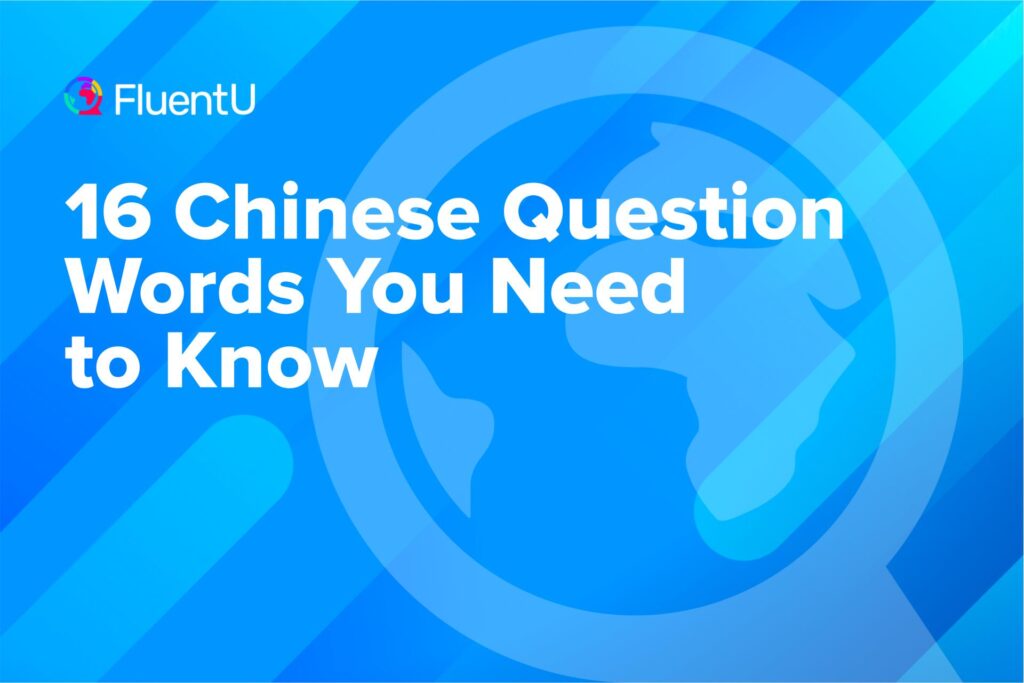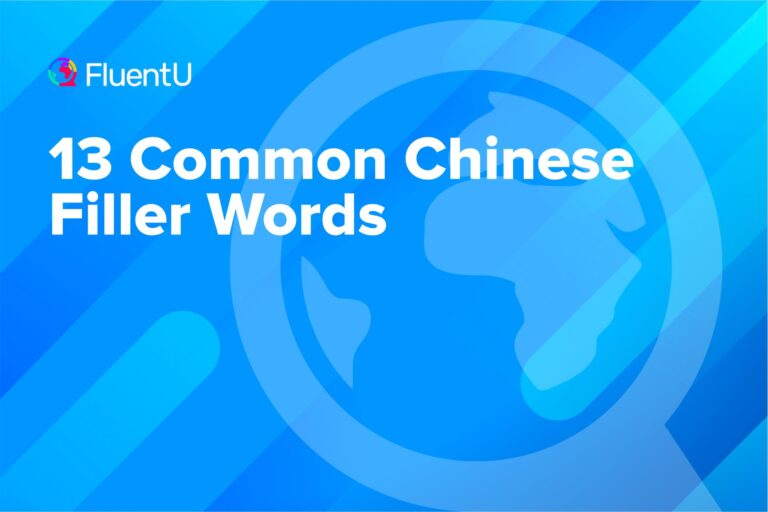Contents
- 1. 谁 (shéi) — Who
- 2. 什么 (shén me) — What
- 3. 哪里 (nǎ lǐ) / 哪儿 (nǎr) — Where
- 4. 哪个 (nǎ ge) — Which
- 5. 什么时候 (shén me shí hòu) — When
- 6. 为什么 (wèi shén me) — Why
- 7. 怎么 (zěn me) — How
- 8. 多少 (duō shǎo) — How many (>10)
- 9. 几 (jǐ) — How many (<10)
- 10. 谁的 (shéi de) — Whose
- 11. 多久 (duō jiǔ) — How long (for short time periods)
- 12. 多长时间 (duō cháng shí jiān) — How long (for long time periods)
- 13. 几点 (jǐ diǎn) — What time is it?
- 14. 什么样的 (shén me yàng de) — What kind of
- 15. 怎么样 (zěn me yàng) — How about
- 16. 还是 (hái shì) — Or
- Chinese Question Words Practice Quiz
- And One More Thing...
16 Chinese Question Words You Need to Know

You probably already know that if you want to ask yes-no questions in Chinese, you can add 吗 (ma) to the end of your sentences. But there are more question words to use—and that’s what we’ll be talking about here.
In this post, you’ll learn all the words you need to ask Chinese questions—when, where, how and everything in between.
Download: This blog post is available as a convenient and portable PDF that you can take anywhere. Click here to get a copy. (Download)
1. 谁 (shéi) — Who
The two most common and simplest structures for using this question word are:
Subject + 是 +谁? (To ask a question like, “who is that?” or “who is he/she?”)
谁 + Verb?
For example:
谁去? (shéi qù?) — Who is going?
她是谁? (tā shì shéi?) — Who is she?
谁来参加聚会? (shéi lái cān jiā jù huì?) — Who is coming to the party?
It’s always good to be able to ask about new people, especially when you’re traveling in China and meeting new people all the time.
The answer to 她是谁 follows the same structure as the question. For example:
她是小云。 (tā shì xiǎo yún.) — She is Xiao Yun.
Hearing this basic question-and-answer sentence structure in use will help you to learn it better. For example, you can use an immersion program like FluentU to see how native Chinese speakers ask (and answer) questions.
FluentU takes authentic videos—like music videos, movie trailers, news and inspiring talks—and turns them into personalized language learning lessons.
You can try FluentU for free for 2 weeks. Check out the website or download the iOS app or Android app.
P.S. Click here to take advantage of our current sale! (Expires at the end of this month.)
2. 什么 (shén me) — What
什么 follows this formula:
Subject + Verb + 什么 (+ Object)?
This word can be used for objects, abstract words, actions, etc.
For example:
这是什么? (zhè shì shén me?) — What is this?
你喜欢吃什么? (nǐ xǐ huān chī shén me?) — What do you like to eat?
你开什么车? (nǐ kāi shén me chē?) — What car do you drive?
3. 哪里 (nǎ lǐ) / 哪儿 (nǎr) — Where
To ask where something is, follow this structure:
Subject + 在 + 哪里 / 哪儿?
The difference between the two variations is that 哪儿 is used in northern China, especially Beijing.
你在哪儿? (nǐ zài nǎr?) — Where are you?
你的哥哥在哪里? (nǐ de gē ge zài nǎ lǐ?) — Where is your older brother?
你把我的手机放在哪儿了? (nǐ bǎ wǒ de shǒu jī fàng zài nǎr le?) — Where did you put my phone?
4. 哪个 (nǎ ge) — Which
This is the question word that you’ll hear a lot when shopping in China, to which you’ll commonly answer with “这个 (zhè ge) — this” or “那个 (nà gè) — that.”
The typical topic structure is:
Subject + Verb+哪个 (+ Object)?
For example:
你要哪个? (nǐ yào nǎ ge?) — Which do you want?
你住在中国的哪个城市? (nǐ zhù zài zhōng guó de nǎ ge chéng shì?) — Which Chinese city do you live in?
你最喜欢哪个季节? (nǐ zuì xǐ huān nǎ ge jì jié?) — Which season is your favorite?
5. 什么时候 (shén me shí hòu) — When
The basic structure for using 什么时候 is as follows:
Subject + 什么时候 + Verb?
For example:
你什么时候回家? (nǐ shén me shí hòu huí jiā?) — When are you coming home?
他什么时候会说完? (tā shén me shí hòu huì shuō wán?) — When will he stop talking?
她什么时候会回美国? (tā shén me shí hòu huì huí měi guó?) — When will she come back to America?
6. 为什么 (wèi shén me) — Why
This question word can be used on its own to create the simple question “why” or used in a more complex structure like:
Subject + 为什么 + Verb?
为 stands for the word “for,” and in this combination, the English equivalent of “what for?”
你为什么吸烟? (nǐ wèi shén me xī yān?) — Why do you smoke?
你为什么学中文? (nǐ wèi shén me xué zhōng wén?) — Why do you study Chinese?
他为什么搬家了? (tā wèi shé me bān jiā le?) — Why did he move away?
7. 怎么 (zěn me) — How
This question word expresses a surprise in the face of an event or situation, and can also express disagreement.
Subject + 怎么 + Verb + Object?
For example:
你怎么不去上课? (nǐ zěn me bú qù shàng kè?) — How can you not go to class?
你是怎么学中文的? (nǐ shì zěn me xué zhōng wén de?) — How do you learn Chinese?
我应该怎么做这个作业? (wǒ yīng gāi zěn me zuò zhè ge zuò yè?) — How should I do this homework/assignment?
8. 多少 (duō shǎo) — How many (>10)
This question word is used when asking about a certain amount higher than ten.
多少 + Object?
For example:
多少钱? (duō shǎo qián?) — How much money? / How much does it cost?
这个房间有多少人? (zhè ge fáng jiān yǒu duō shǎo rén?) — How many people are there in this room?
你住在这里住了多少年了? (nǐ zhù zài zhè lǐ zhù le duō shǎo nián le?) — How many years have you been living here?
9. 几 (jǐ) — How many (<10)
This question word is used only for a small number of objects under ten.
几 + Measure Word + Object?
If you want to ask a question about a bigger amount of items, you’ll use 多少.
你会说几门语言? (nǐ huì shuō jǐ mén yǔ yán?) — How many languages can you speak?
你去过几个国家? (nǐ qù guò jǐ gè guó jiā?) — How many countries have you been to?
你家里有几个人? (nǐ jiā li yǒu jǐ gè rén?) — How many people are in your family?
10. 谁的 (shéi de) — Whose
的 is the particle that expresses possession, so adding it after 谁—which we learned means “who”—turns it into 谁的 (whose).
When asking whose of something, 谁的 usually comes before the noun. When there’s no specific noun—such as in the question “Whose is this?”—it comes at the end of the sentence. So the formula would be:
谁的 + Noun/Object
For example:
这是谁的? (zhè shì shéi de?) — Whose is this?
这是谁的书? (zhè shì shéi de shū?) — Whose book is this?
那是谁的手机在桌子上? (nà shì shéi de shǒu jī zài zhuō zi shàng?) — Whose phone is on the table?
11. 多久 (duō jiǔ) — How long (for short time periods)
多久 is used to ask how long something has been happening for, but is normally only used when the answer is expected to be relatively short. “Short” will depend on the context of the question, but it’s generally when someone expects that it hasn’t been going on very long.
The formula is:
Subject + Verb + (了 if in past tense) + 多久?
If the action is still happening, you’d add another 了 at the end of 多久:
Subject + Verb + 了 + 多久 + 了?
For example:
你等了多久? (nǐ děng le duō jiǔ?) — How long did you wait?
你学中文学了多久了? (nǐ xué zhōng wén xué le duō jiǔ le?) — How long have you been studying Chinese?
你打算在中国生活多久? (nǐ dǎ suàn zài zhōng guó shēng huó duō jiǔ?) — How long do you plan to live in China?
12. 多长时间 (duō cháng shí jiān) — How long (for long time periods)
多长时间 also means “how long” but is used when the answer is expected to be a longer time. The formulas are the same as with 多久:
Subject + Verb + (了 if in past tense) + 多长时间?
Subject + Verb + 了 + 多长时间 + 了?
For example:
到北京需要多长时间? (dào běi jīng xū yào duō cháng shí jiān?) — How long does it take to get to Beijing?
你在美国住了多长时间了? (nǐ zài měi guó zhù le duō cháng shí jiān le?) — How long have you lived in the United States?
你的航班飞了多长时间? (nǐ de háng bān fēi le duō cháng shí jiān?) — How long was your flight?
13. 几点 (jǐ diǎn) — What time is it?
几点 is used to ask for a specific time. The formula is:
Subject + 几点 + Verb?
For example:
你几点起床? (nǐ jǐ diǎn qǐ chuáng?) — What time do you get up?
火车几点到? (huǒ chē jǐ diǎn dào?) — What time does the train arrive?
会议几点开始? (huì yì jǐ diǎn kāi shǐ?) — What time does the meeting start?
If you want to ask what time it is right now, you can just say:
几点了? (jǐ diǎn le?) — What time is it?
14. 什么样的 (shén me yàng de) — What kind of
什么样的 is used to ask about the type or kind of something. The formula used is:
Subject + Verb + 什么样的 + Noun?
For example:
你喜欢什么样的音乐? (nǐ xǐ huān shén me yàng de yīn yuè?) — What kind of music do you like?
你想吃什么样的菜? (nǐ xiǎng chī shén me yàng de cài?) — What kind of food do you want to eat?
他是什么样的人? (tā shì shén me yàng de rén?) — What kind of person is he?
15. 怎么样 (zěn me yàng) — How about
怎么样 comes at the end of questions asking about the condition or state of something or when asking for someone’s opinion. It’s commonly used when making suggestions. The formula is:
Subject + Verb + Object + 怎么样?
For example:
这本书怎么样? (zhè běn shū zěn me yàng?) — How is this book? / What do you think of this book?
你昨天考试怎么样? (nǐ zuó tiān kǎo shì zěn me yàng?) — How was your exam yesterday?
明天怎么样? (míng tiān zěn me yàng?) — How about tomorrow?
16. 还是 (hái shì) — Or
还是 is a connective word that means “or.” It gives the option between two or more choices. But it’s important to know that 还是 can’t be used in statements (such as “I’ll go on Friday or Saturday”)—for those we use 或者 (huò zhě).
Here’s the formula for using 还是:
Option 1 + 还是 + Option 2?
For example:
他是学生还是老师? (tā shì xué shēng hái shì lǎo shī?) — Is he a student or a teacher?
你要茶还是咖啡? (nǐ yào chá hái shì kā fēi?) — Do you want tea or coffee?
我们今天去,还是明天去? (wǒ men jīn tiān qù, hái shì míng tiān qù?) — Should we go today or tomorrow?
Chinese Question Words Practice Quiz
Fill in the blanks with the correct Chinese question word, then check your answers below.
1. 他的女朋友是___?(tā de nǚ péng yǒu shì ___?) — Who is his girlfriend?
2. 你在找___东西?(nǐ zài zhǎo ___ dōng xī?) — What are you looking for?
3. 他们住在___?(tā men zhù zài ___?) — Where do they live?
4. 你想买___手机?(nǐ xiǎng mǎi ___ shǒu jī?) — Which phone do you want to buy?
5. 你___去上班?(nǐ ___ qù shàng bān?) — When do you go to work?
6. 你___迟到了?(nǐ ___ chí dào le?) — Why are you late?
7. 你___到学校的?(nǐ ___ dào xué xiào de?) — How did you get to school?
8. 这件衣服___钱?(zhè jiàn yī fu ___ qián?) — How much is this clothing?
9. 你有___个兄弟姐妹?(nǐ yǒu ___ gè xiōng dì jiě mèi?) — How many siblings do you have?
10. 这是___钱包?(zhè shì ___ qián bāo?) — Whose wallet is this?
11. 你在中国待了___?(nǐ zài zhōng guó dāi le ___?) — How long did you stay in China?
12. 这场会议会持续___?(zhè chǎng huì yì huì chí xù ___?) — How long will this meeting last?
13. 现在___了?(xiàn zài ___ le?) — What time is it now?
14. 你想要___礼物?(nǐ xiǎng yào ___ lǐ wù?) — What kind of gift do you want?
15. 今天天气___?(jīn tiān tiān qì ___?) — How’s the weather today?
16. 你想喝茶___咖啡?(nǐ xiǎng hē chá ___ kā fēi?) — Do you want tea or coffee?
Answer key:
1. 谁
2. 什么
3. 哪里
4. 哪个
5. 什么时候
6. 为什么
7. 怎么
8. 多少
9. 几
10. 谁的
11. 多长时间
12. 多久
13. 几点
14. 什么样的
15. 怎么样
16. 还是
Learning this unique language is not as hard as it might seem. Always remember that we Chinese learners are in this together. When unsure about something, ask, ask, ask away!
Download: This blog post is available as a convenient and portable PDF that you can take anywhere. Click here to get a copy. (Download)
And One More Thing...
If you want to continue learning Chinese with interactive and authentic Chinese content, then you'll love FluentU.
FluentU naturally eases you into learning Chinese language. Native Chinese content comes within reach, and you'll learn Chinese as it's spoken in real life.
FluentU has a wide range of contemporary videos—like dramas, TV shows, commercials and music videos.
FluentU brings these native Chinese videos within reach via interactive captions. You can tap on any word to instantly look it up. All words have carefully written definitions and examples that will help you understand how a word is used. Tap to add words you'd like to review to a vocab list.
FluentU's Learn Mode turns every video into a language learning lesson. You can always swipe left or right to see more examples for the word you're learning.
The best part is that FluentU always keeps track of your vocabulary. It customizes quizzes to focus on areas that need attention and reminds you when it’s time to review what you’ve learned. You have a 100% personalized experience.
Start using the FluentU website on your computer or tablet or, better yet, download the FluentU app from the iTunes or Google Play store. Click here to take advantage of our current sale! (Expires at the end of this month.)











